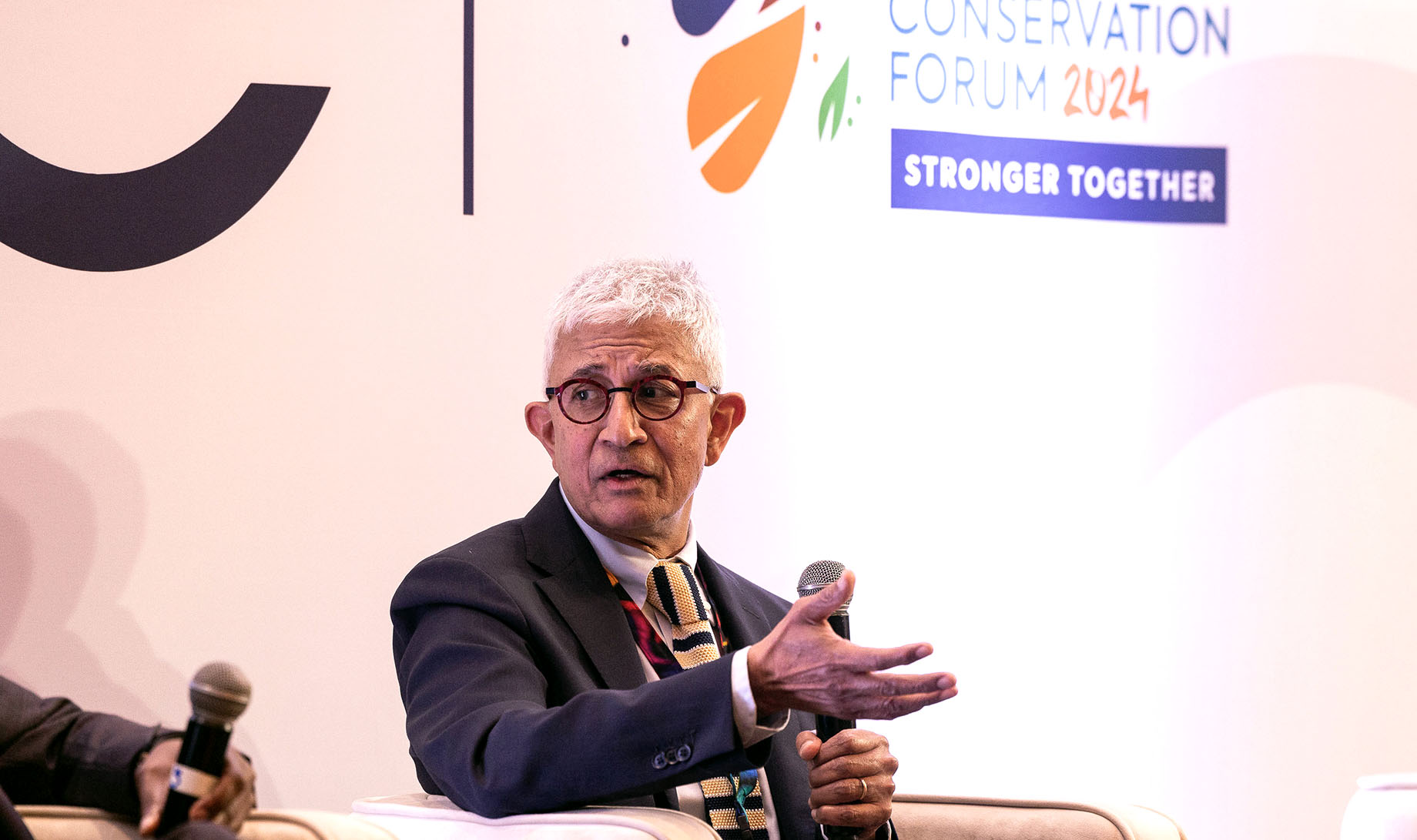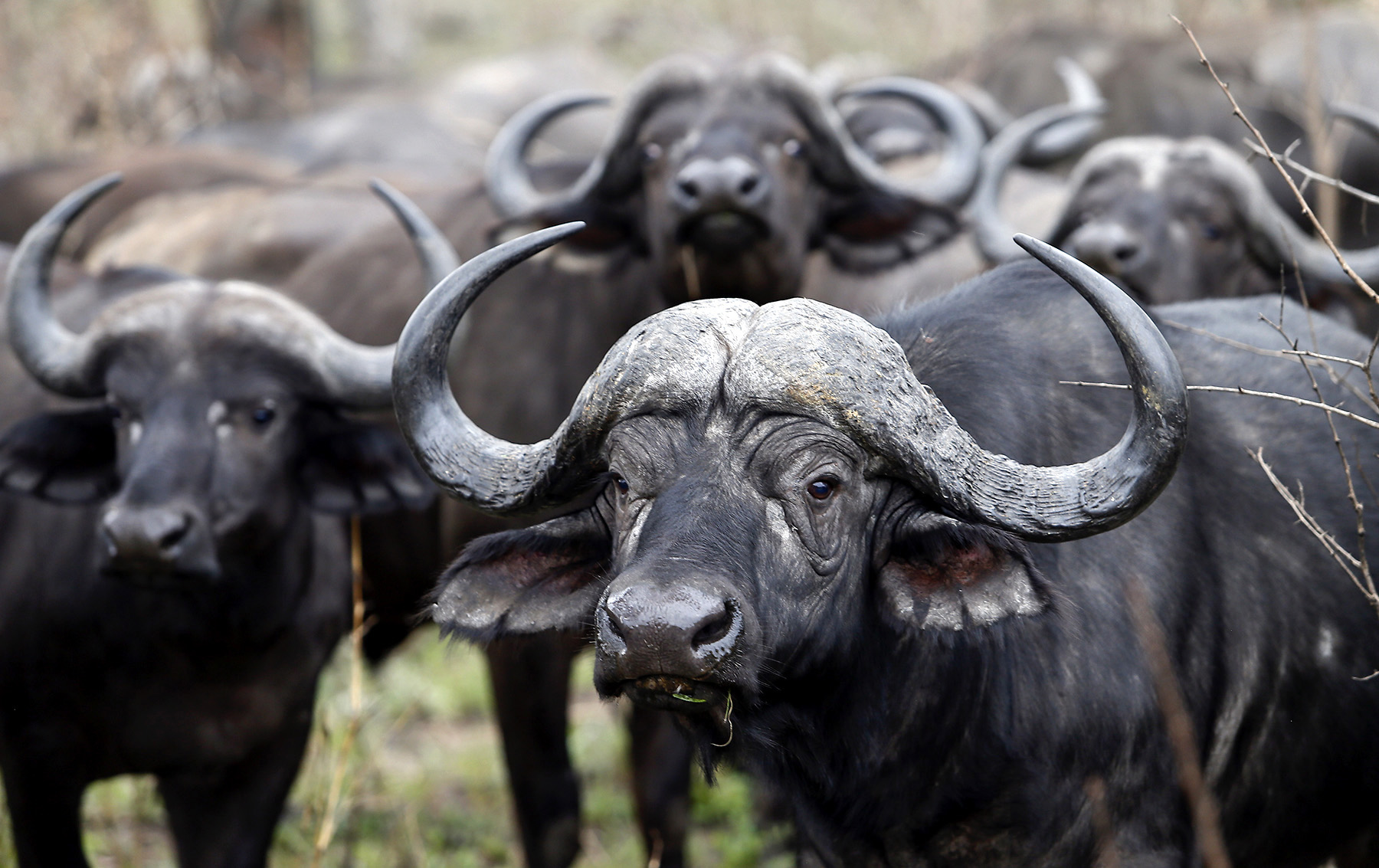The sentiment at the recent International Union for Conservation of Nature (IUCN) forum in Nairobi was that Africa needs to fund its conservation efforts and move away from Western dependency. For the first time, African governments, NGOs, conservation authorities and research institutions gathered under one roof to set an African agenda and develop their shared voice for nature conservation.
 Valli Moosa, Presidential Climate Commission (PCC) deputy chairperson, former president of the IUCN, former Minister of Constitutional Development and Minister of Environment in South Africa, addressed delegates at the opening ceremony of the IUCN Africa Conservation Forum 2024. (Photo: Supplied / IUCN)
Valli Moosa, Presidential Climate Commission (PCC) deputy chairperson, former president of the IUCN, former Minister of Constitutional Development and Minister of Environment in South Africa, addressed delegates at the opening ceremony of the IUCN Africa Conservation Forum 2024. (Photo: Supplied / IUCN)
When the IUCN was formed more than 70 years ago, Africa was undergoing a post-colonial transformation. Now the continent has embraced democracy and African scientists have become leaders in nature conservation, with Africa primed to be a key player in global biodiversity conservation.
However, a joint African voice and agenda has not been set until now, and the key to establishing this voice is linking the welfare and prosperity of people with nature conservation; a reduced reliance on external foreign funding for nature conservation work in the continent, which often leads to external control over agendas; fostering cooperation and dialogue across the continent; and including indigenous people in nature conservation work and science.
Africa’s nature conservation agenda
“Africa is the continent that has the best-preserved biodiversity in the world, yet the African voice does not come through. You find that the agenda for nature conservation is determined largely by the Global North for Africa, not because they’re trying to be bad but that is just how it is,” said Valli Moosa in an interview with Daily Maverick on the sidelines of the forum in Nairobi.
“For a very long time, there was a colonial wisdom that existed that Africans needed to be taught about nature conservation and educated about the importance of nature conservation, when the evidence is that Africans have been better at nature conservation than anybody else. The world’s best-preserved biodiversity is on the African continent and the worst-preserved biodiversity is in Europe.”
Moosa is the former president of the IUCN and the deputy chair of the Presidential Climate Commission (PCC) in South Africa. He is a former minister of constitutional development under Nelson Mandela and a former minister of the environment under Thabo Mbeki.
Moosa said the key to Africa’s agenda in nature conservation was equity in the sharing of benefits from all of nature. “Unless what we do is about improving the inequality that we have on this continent and global inequality, we will fail.”
 IUCN President Razan al Mubarak addresses delegates at the opening ceremony of the IUCN Africa Conservation Forum 2024. (Photo: Supplied / IUCN)
IUCN President Razan al Mubarak addresses delegates at the opening ceremony of the IUCN Africa Conservation Forum 2024. (Photo: Supplied / IUCN)
Another key part of the agenda of the African continent, said Moosa, was for it to fund its nature conservation work.
“There’s no reason why we shouldn’t do it… It’s affordable for us as African governments and businesses to support. It’s not something that we need to depend on others to fund… When we depend on others to fund our work, they will set the programmes for which money is available.”
Through governments, ecotourism and the business sector in Africa, Moosa said the continent could and should provide more funding for its wildlife organisations, institutions and nature conservation authorities.
Moosa said this did not mean Africa should reject foreign funding, but that the majority of funding for nature conservation needed to come from within Africa.
“There’s nothing wrong with taking money from Western countries, from anybody to do the environmental work that you have to do. The only thing is that any funding agency around the world has its own priorities, whereas, we as Africans, should have our big priority… how to narrow the gap between those living in cities and those living in rural areas where a lot of our biodiversity is, how to manage wildlife and people; and how to practise biodiversity and nature conservation side by side with agricultural activity.”
Decolonising nature conservation in Africa
In an article published in the Journal of Political Ecology in January, researchers from Spain, the UK and Tanzania said the need to decolonise biodiversity conservation had become a matter of concern for some academics and practitioners in the field.
They said, “Decolonising biodiversity conservation science and practice involves a transition towards more locally rooted, plural, socially just and convivial forms of conservation, moving away from mainstream conservation approaches, such as protected areas, sustainable resource management plans, or market-based instruments that are strongly rooted in Eurocentric ontologies and epistemologies.”
This was echoed in seminars of the IUCN’s Africa Conservation Forum with IUCN members, government agencies, the business sector, indigenous people and scientific experts.
The forum was one of several IUCN regional conservation forums, held across the globe this year, that offer members an opportunity to shape the agenda for the IUCN World Conservation Congress, to be held in the United Arab Emirates in 2025. That congress, in turn, sets the global conservation agenda for the years ahead.
 David Obura, chair of the Intergovernmental Science-Policy Platform on Biodiversity and Ecosystem Services and Director of Cordio East Africa, addressed delegates at the opening ceremony of the IUCN Africa Conservation Forum 2024. (Photo: Supplied / IUCN)
David Obura, chair of the Intergovernmental Science-Policy Platform on Biodiversity and Ecosystem Services and Director of Cordio East Africa, addressed delegates at the opening ceremony of the IUCN Africa Conservation Forum 2024. (Photo: Supplied / IUCN)
In an interview, David Obura, the director of Coastal Oceans Research and Development (Indian Ocean) in East Africa and chair of the Intergovernmental Science-Policy Platform on Biodiversity and Ecosystem Services, said: “We have to disrupt the current system because the current system is not good for Africa. It doesn’t give us an equal voice.
“We need to be in control of our own finances. We have the natural resources and riches over here, but the problem is we let it be exported at bad rates.
“We’ve exported an immense amount of resources over the last 200, 300, or 400 years for almost nothing. There’s a big credit or debt that is owed to Africa for that (similar to the climate inequality and climate justice movement).
“Almost the entire global carbon budget has been consumed by more developed regions and there’s no space for us to develop with what would have been our fair share — not that we should develop the carbon emissions now, but it’s just one indicator of the broader syndrome. We need to disrupt that.”
 The International Union for Conservation of Nature (IUCN) Africa Conservation Forum in the Kenyan capital, Nairobi, under the theme African Solutions for Nature and People: Creating transformative responses to the biodiversity and climate crisis in Africa. (Photo: Supplied / IUCN)
The International Union for Conservation of Nature (IUCN) Africa Conservation Forum in the Kenyan capital, Nairobi, under the theme African Solutions for Nature and People: Creating transformative responses to the biodiversity and climate crisis in Africa. (Photo: Supplied / IUCN)
Obura reiterated Moosa’s sentiment that the conservation agenda had been led from the West.
“We’ve had a very protectionist, preservationist, exclusionist approach projected into conservation globally. Then in the ’50s and ’60s, that was changing but still, old habits die hard… We have Western modern science we use, but there’s very much a Western morality behind that, when islanders and indigenous communities in Africa with very different cultural backgrounds, religions have a very different approach to nature.
“Now we have to find a way to blend all of these together, because we’re a fully connected planet, and that’s a big challenge in Africa. We have to work out how we can develop our own voice and our objective,” Obura said.
Africa is grappling with significant challenges resulting from the dual crisis of climate change and biodiversity loss, necessitating the need for coordinated nature-climate action at a regional level.
IUCN Director-General Dr Grethel Aguilar said, “It is the first time we are holding a forum as one African continent, and I know this was the correct decision, because the voices of Africa are better and stronger together. People must be at the centre of our actions. United, we can create solutions that help people and nature thrive, recognising the rights of indigenous peoples and local communities.” DM
Kristin Engel was sponsored by the International Union for Conservation of Nature (IUCN) to attend the IUCN Africa Conservation Forum in Nairobi from 24-28 June as a media delegate.
Daily Maverick’s journalism is funded by the contributions of our Maverick Insider members. If you appreciate our work, then join our membership community. Defending Democracy is an everyday effort. Be part of it. Become a Maverick Insider.
https://www.youtube.com/watch?v=REeWvTRUpMk




 The International Union for Conservation of Nature (IUCN) Africa Conservation Forum in the Kenyan capital, Nairobi, under the theme African Solutions for Nature and People: Creating transformative responses to the biodiversity and climate crisis in Africa. (Photo: Supplied / IUCN)
The International Union for Conservation of Nature (IUCN) Africa Conservation Forum in the Kenyan capital, Nairobi, under the theme African Solutions for Nature and People: Creating transformative responses to the biodiversity and climate crisis in Africa. (Photo: Supplied / IUCN) 